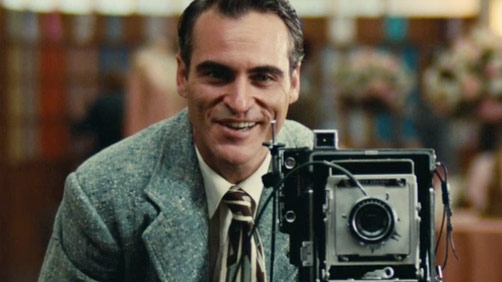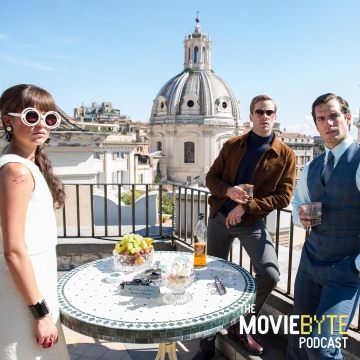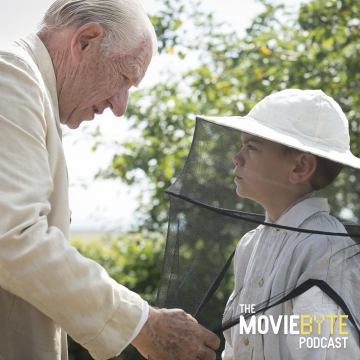
Smart, powerfully acted, beautifully filmed, and solidly engrossing, The Master extends writer/director Paul Thomas Anderson’s winning streak of challenging films for serious audiences.
This striking portrait of drifters and seekers in post World War II America, Paul Thomas Anderson’s The Master unfolds the journey of a Naval veteran (Joaquin Phoenix) who arrives home from war unsettled and uncertain of his future — until he is tantalized by The Cause and its charismatic leader (Philip Seymour Hoffman).
Story line
Freddie Quell (Joaquin Phoenix) is a mentally disturbed man that has lived a tragic life. Now trying to rediscover himself in his non-existent-yet-better past life, he’s joined the followers of The Cause charismatic leader Lancaster Dodd (Philip Seymor Hoffman). This cult is taking advantage of post World War II American depressed society while trying to teach people a thing or two about their theoretical inner perfection.
In the present, in their current condition, all the members of The Cause are anything but perfect. Freddie mixes chemicals for drinks when he doesn’t have his mind otherwise preoccupied in the gutter. Lancaster lives for nothing more than thrills, power, and pride. And perhaps the real “master” is none other than Dodd’s genteel wife, Mary Sue Dodd (Amy Adams) who won’t let anything stand in the way of The Cause.
Little by little the camaraderie Freddie and Lancaster share is eroded by their health problems, individual lusts, and emotional struggles. Coming to a breaking point, one has to wonder will Freddie Quell lose his mind and destroy all glimmers of hope left for his restoration? Will the Dodds be imprisoned for past actions? And who exactly is “the master” in this triangle?
The Master is a conflicted morality tale for the immoral soul. Just what the message of the film is comes through loud and clear in one of the last moments of the film, driving home the art of the film and its mastery of storytelling. But art is in the eye of the beholder, so the audience will have to decide whether Paul Thomas Anderson’s work is a masterpiece or a pig wearing a gold nose ring.
Rating - 3.5 out of 5 stars
The Master is a cinematic thrill for artists. It’s a morality tale that exploits the absurdity of some cultish worldviews to cleverly illustrate a very simple yet transcendent truth (amidst a boat load of lies). The acting is exceptionally believable and well-played for the time period of the story, especially showing off Joaquin Phoenix’s potent acting talents. The story certainly feels like it may be based on actual events (although it wasn’t, according to the filmmakers).
On the other hand, the movie is littered with immorality and emotional disturbia. The story wouldn’t be valuable and impactful if it lacked the dark side of story (sin out of necessity?). It is anyone’s guess whether the depths of the depravity shown were necessary. Personally, I found the immorality and violence and depression too strong for my tastes.
What Didn’t Work
The movie is long and it feels long. If I weren’t paying attention to it for the sake of review, I would dare say that I could’ve been bored with it at times. Little progresses over the two hours and 18 minutes of film, so if you have a weak attention span this movie will remind you of it a lot in that amount of time.
It also is not a film that I’m particularly fond of. I doubt I’ll make the time to watch it ever again. Once explored and the curiosity to see it once has been satisfied, there isn’t much here to revisit. It’s like a walk through an alley — you do it the first time because you’re curious. The first time you found some interesting stuff in that alley, but you don’t really want to tread that passage way ever again. It just isn’t all that productive or entertaining the second time through.
It’s a journey into the futility of existence, and that’s not a subject I want to visit all that often.
What Works
There’s so many layers to this story and ways to interpret it that you will have something to ponder for days to come. It’s a critique on religion, humanism in general, the pathetic attempts man conjures up to reach transcendence… It addresses historical wrongs, society’s cravings, Scientology, et cetera.
This, like most of Paul Thomas Anderson’s films, is regarded as a work of cinema to behold. Anderson’s story is impressive in his ability to relate truth through a story where no one in the story knows what truth is. For a film that relates humanism at it’s worst it strangely tells sobering and powerful realities.
Performances are beyond rich. Phoenix nailed his neanderthal-like character. I agree with others this film’s storytelling might even be trumped by Phoenix’s acting performance. And let’s not forget Hoffman as the leader of the cult: Phillip’s Lancaster Dodd makes such a likable not-good guy. I’d dare say Philip Seymor Hoffman could play Hitler and I’d find him likable on some wavelength.
To address the cinematography, I turn to Brett McCracken’s review on Christianity Today:
The style of the film also bears Anderson’s mark: long tracking shots, dissonant orchestral music (here, by Radiohead’s Johnny Greenwood), highly structured shot composition, and frequent usage of repetition. Throughout the film we see “doubles” of various shots/scenes that are repeated in a new way later in the film: Quell’s early psychiatric evaluation matched later by his “processing” scene with Dodd; a rowdy naval ship at the outset, matched later by a prim and proper “Cause” cruise ship; Quell running away from danger in a field in one early scene; driving away on a motorcycle in the desert later in the film. As in his previous films, Anderson uses these doubles strategically to bring attention to the changes and contrast within the protagonist’s arc. A double referent in the film’s final scene a bookend to one of the film’s first scenes on a beach—plays an especially crucial role in making sense of the film as a whole.
The supporting cast also deserves a round of applause. To really appreciate what they have to offer, you just need to watch the film.
The musical score is beautiful, haunting, tragic, and oddly agreeable in its dissonance. If I had to listen to the soundtrack on it’s own I doubt it would work this well, but it’s faithful to the story and supports it like few soundtracks do.
Interesting trivia: it’s not scientology, officially.
It’s been widely discussed that the religion in the story has all the earmarks to be a portrayal of the cult Scientology. The director denies it is Scientology, but from my vantage point it’s clear this is a fictional adaptation of the cult’s history. Paul Thomas Anderson was interviewed and asked about this directly, to which he basically said, “For the record, this is not Scientology because we don’t want to be sued for it.”

Who would enjoy this film?
This movie is a great example that a masterpiece is in the eye of the beholder. If you like art for art’s sake — something that aims for transcendence in spite of entertainment value — then this is probably going to tickle your fancy. If you would rather not go through two hours of throught-provoking subtext and philosophical statements, then this movie is reserved for viewing in a pathetic film appreciation class at university.
It’s not that The Master is a lacking film. The technical is masterful. The themes are relatable for all human beings. But the story is seedy, clouded, riddled with carnality and human vice. If you find yourself liking a character in the film it’s in spite of their laundry list of scruples.
So if you enjoy complex characters, philosophy, immorality tales, and an overarching sense of cynicism, this movie will interest you. Even so, don’t be surprised if you come away from it a little bored with it and feeling depressed.


